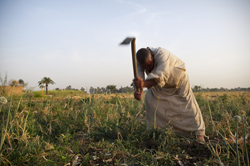Upgrading collaboration for agriculture research
The 'Building up a platform for African-European partnership on agricultural research for development' (Paepard) project worked to stimulate and improve on collaboration among European and African agriculture research for development (ARD) stakeholders through better opportunities for mutual learning and knowledge sharing. In this way, the initiative aimed to increase the number and value of European Development Fund 10 (EDF10) and EU-funded Seventh Framework Programme (FP7) joint research projects for African ARD. The Forum for Agricultural Research in Africa (FARA) and the European Forum on Agricultural Research for Development (EFARD), through its institutional networks the European Consortium for Agricultural Research in the Tropics (ECART) and the Network of European Agricultural (Tropically and Sub-Tropically Oriented) Universities and Scientific Complexes Related with Agricultural Development (NATURA), were the project's main partners and contractors. Project members made an assessment of certain African–European ARD partnerships together with an online survey of European and African stakeholders, and held three consultation workshops in Africa. The results and main findings of these activities were published in a 2007 report identifying a number of major constraints critical to the progress of African-European ARD collaboration. According to researchers, ARD partnerships have the following characteristics: there is a lack of information and knowledge regarding funding opportunities; partners come mainly from universities and research institutes resulting in limited private sector or civil society participation; EC-funded coordination mechanisms can do more to facilitate interaction among the various stakeholders; and African partners find it difficult to access EC instruments supporting ARD and encounter difficulties in implementing financial and administrative rules. Paepard efforts highlighted the importance of a platform linking the two continents for a community of practice among scientists, farmers, non-governmental organisations (NGOs), and private sector and government officials. Lessons learned emphasise the need for more inclusive research partnerships that also involve non-research stakeholders, neutral intermediaries who can facilitate communication and assist in the formulation of related initiatives, mechanisms and resources supporting dynamic partnerships, and an effective information system for relevant information on funding opportunities. Putting such support mechanisms in place promises to boost Millennium Development Goal (MDG)-oriented initiatives and help Africa benefit from a better coordinated ARD community, offering relevant skills and knowledge for the battle against poverty and environmental threats.



